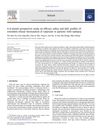Search
forProducts matching "oral use"
Tracking 56 products like 13 Lonitab 10 mg, 16 Oral Finasteride, 18 Finasteride+Minoxidil+supplement Blend, 19 Minoxidil+supplement Blend and 30 Finasteride pills from by companies like AllDayChemist, Hims and Keeps. View all 56 products »
Sort by
Research
60-90 / 1000+ results
research Discovery of Natural Steroid 5 Alpha-Reductase Inhibitors
Natural herbal compounds might treat certain medical conditions by reducing DHT levels, but more research is needed to confirm their effectiveness and safety.

research What Do We Know About 5-Alpha Reductase Inhibitors?
Finasteride and dutasteride are effective for male hair loss and enlarged prostate but may cause reversible sexual side effects.
research Dahuang-Gancao Decoction Ameliorates Testosterone-Induced Androgenetic Alopecia in Mice
Dahuang-Gancao Decoction improves hair growth in androgenetic alopecia.

research Enhanced Skin Permeation of 5α-Reductase Inhibitors Entrapped into Surface-Modified Liquid Crystalline Nanoparticles
Special nanoparticles increased skin absorption of hair loss treatments with fewer side effects.
research A Finasteride Patch for the Treatment of Androgenetic Alopecia: Study on Permeability Strategy Using Synthetic O-Acylmenthols and Ion-Pair
The finasteride patch effectively treats hair loss by enhancing skin absorption.

research Efficacy of Off-Label Topical Treatments for the Management of Androgenetic Alopecia: A Review
Some off-label treatments increase hair density, but long-term safety unknown.

research Topically Applied N,N-Dimethylglycine Sodium Salt Enhances Human Skin Blood Flow by Inducing Endothelial Nitric Oxide Release
Applying DMG-Na to the skin increases blood flow and may help with skin conditions.

research Cosmeceuticals in Dermatology
Cosmeceuticals may benefit skin health but need more research for efficacy and safety confirmation.

research A 6-Month Prospective Study on Efficacy, Safety, and Quality of Life Profiles of Extended-Release Formulation of Valproate in Patients with Epilepsy
Extended-release valproate effectively reduced seizures and improved quality of life in epilepsy patients over 6 months, with some side effects.

research Adverse Events in Isotretinoin Therapy: A Single-Arm Meta-Analysis
Isotretinoin therapy for acne can cause many reversible side effects, mainly mild skin conditions, and patient understanding of these effects can improve treatment adherence.
research Safety of Skin Care Products During Pregnancy
Most skin care products are safe during pregnancy, but avoid hydroquinone and tretinoin.

research Flutamide-Loaded Zein Nanocapsule Hydrogel: A Promising Dermal Delivery System for Pilosebaceous Unit Disorders
The flutamide-loaded hydrogel is a promising, skin-friendly treatment for acne and hair loss, potentially requiring less frequent application.

research Androgenetic Alopecia: Therapy Update
There are many treatments for common hair loss, but more trials are needed to decide which are best.

research Effectiveness and Safety of Hair Growth Formulation Containing Tectona Grandis L.f (Teak) Leaf Extract: A Randomized, Double-Blind, Placebo-Controlled Study on Males with Androgenic Alopecia
Teak leaf extract may effectively and safely promote hair growth in males with androgenic alopecia.

research Novel Agents for the Treatment of Alopecia
New treatments for hair loss show promise, especially finasteride for men and a stronger minoxidil formula.

research Medical Treatments for Male and Female Pattern Hair Loss
Minoxidil and finasteride treat hair loss in men, while minoxidil treats hair loss in women.
research Male Androgenetic Alopecia
Male pattern baldness worsens with age and can be treated with medications like minoxidil and finasteride, but side effects and personalized care are important.

research Topical Nanoemulgel: A Novel Pathway for Investigating Alopecia
Nanoemulgel could be a promising new treatment for hair loss.

research Botanical Extract Combined with Minoxidil Improves Hidrotic Ectodermal Dysplasia Caused by p.G11R Mutations: A Case Report
Botanical extracts and Minoxidil improved hair condition in a boy with a genetic disorder.

research Single Nucleotide Polymorphisms Associated with Elevated Alanine Aminotransferase in Patients Receiving Asunaprevir Plus Daclatasvir Combination Therapy for Chronic Hepatitis C
Certain genetic variations are linked to higher liver enzyme levels in patients treated for chronic hepatitis C with specific drugs.

research Granules of Finasteride and Cyclodextrin Obtained by Hot-Melt Extrusion to Target the Hair Follicles
Granules improve hair loss treatment by targeting follicles.

research Nutraceuticals in Dermatology
Certain nutrients can improve skin health and treat skin problems safely.

research The Shifting Preferences of Patients and Physicians in Nonsurgical Hair Loss Treatment
Minoxidil and Finasteride are the most popular hair loss treatments, with rising interest in other options, and economic or health crises can change what treatments people prefer.

research Is Skin Microneedling a Good Alternative Method for Various Skin Defects Removal
Microneedling is a safe and effective way to improve various skin conditions with minimal side effects.

research A Thallium-Based Screening Procedure to Identify Molecules That Modulate the Activity of Ca2+-Activated Monovalent Cation-Selective Channels
The conclusion is that a new test was created to find substances that affect specific ion channels, and it works well for drug discovery.

research A Systematic Review of Anti-Aging Effects of 23 Traditional Chinese Medicines
Some traditional Chinese medicines may have anti-aging benefits and could help with hair growth, but more research is needed.

research Androgen Insufficiency in Women: Diagnostic and Therapeutic Implications
Testosterone replacement can help women with low libido and mood, but they need to have enough estrogen first to avoid side effects.

research The Role of Androgen Therapy
Testosterone therapy can help women with androgen deficiency by improving energy, sex drive, and bone health with few side effects.
research Follicular-Targeted Delivery of Spironolactone Provided by Polymeric Nanoparticles
Nanoparticles can effectively deliver spironolactone to hair follicles for treating alopecia and acne.